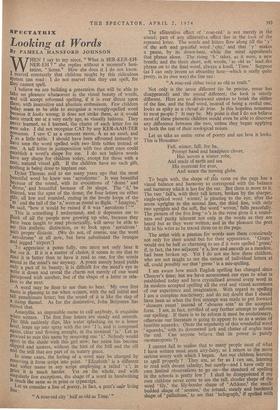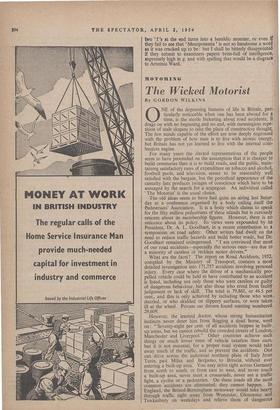SPECTATRIX
Looking at Words
WHEN I say to my niece, " What is SER-KER-EH- NER-EH ? " she replies without a moment's hesi- tation, " Scene." How she does it I do not know. I marvel constantly that children taught by this ridiculous system can read : I do not marvel that they can spell, for they cannot spell. 1 believe we are building a generation that will be able to take no pleasure whatsoever in the visual beauty of words, and will accept reformed spelling, if it is ever thrust upon them, with insensitive and absolute enthusiasm. Few children today seem to be able to recognise a wrongly-spelled word because it looks wrong; it does not strike them, as it would have struck me at a very early age, as visually hideous. They never learned, as I learned, the charm of each letter for its own sake. I did not recognise CAT by any KER-AAH-TER nonsense. I saw C as a crescent moon, A as an easel, and T as a little table. I should have been affronted instantly to have seen the word spelled with two little tables instead of one. A tall letter in juxtaposition with two short ones could establish a word's shape for me. I do not believe words have any shape for children today, except for those with a rare, natural visual gift. If the children have no such gift, nothing is being done to implant one. Dylan Thomas said to me many years ago that the most beautiful word he knew was ' aerodrome.' It was beautiful because of the sound, with its evocations of ' dome' and `drone,' and beautiful because of its shape. The ' d,' he insisted, was the apex of the dome; the four letters on either Side, all low and rounded, ending in the lovely loops of the m ' and the tail of the ' e,' were as round as flight. " Imagine," be said, "how it would be ruined if it was ' aerodrote ! ' " This is something I understand; and it depresses me to think of all the people now growing up who, because they have been taught to read phonetically, will never be able to see this aesthetic distinction, or to look upon ' aerodrote ' With proper distaste. (We do not, of course, use the word aerodrome' at all now, but have substituted the brusque and jagged ' airport.) To appreciate a poem fully, one must not only hear it but see it. If it is a matter of choice, it seems to me that to read it is better than to have it read to one, for the words sound in the mind's ear anyway. A poem merely heard yields Only a part of its beauty; it is difficult for the mind's eye to juxtaposed it down and reveal the charm not merely of one word Juxtaposed with another, but of the shape of a letter in rela- tion to the next. .
A word may be finer to see than to hear. My own first name is pleasing to me when written, with the tall initial and tail penultimate letter; but the sound of it is like the slap of a damp flannel. As for the diminutive, John Betjeman has ruined that. The alliterative effect of rose-red' is not merely in the sound; part of any alliterative effect lies in 'the look of the repeated letter. The words and letters flow along till the y ' of the soft and graceful word .` city,' and that y' makes a pause, by its down-beat, while the mind apprehends that phrase alone. The rising h ' takes, as it were, a new breath; and the three short, soft words, as old as ' lead .the phrase on to the final word, always a knell, Time.' Suppose (as I can only invent an absurdity here—which is really quite pretty, in its own way) the line ran : " A rose-red zither twice as old as truth."
Not only is the sense different (to be precise, sense has disappeared) and the sound different; the look is utterly different. Here are no downward strokes to break the slither of the line, and the final word, instead of being a restful one, looks as spiky as a cheval de 'rise. Is this hopeless nonsense to most people ? It may be. My point is that I do not believe most of these phonetic children would even be able to discover any difference between the two, unless they began applying to both the test of their zoological noises.
Let us take an entire verse of poetry and see how it looks. This is Housman : Fall, winter, fall; for he, Prompt hand and headpiece clever, Has woven a winter robe, And made of earth and sea His overcoat for ever, And wears the turning globe.
To begin with, the shape of this verse on the page has a visual balance and harmony to correspond with the balance and harmony which it has for the ear. But there is more to it. The two fall's, with their tall letters, broken by the sharper, single-spiked word ' winter,' is pleasing to the eye; after the seven uprights in the second line, the third line, with only two uprights and the soft, flat word woven,' falls peacefully. The pattern of the five long o 's in the verse gives it a round- ness and purity inherent not only in the words as they are heard but as they were written, and in the pleasure the poet felt in his wrist as he traced them on to the page.
The artist with a passion for words uses them consciously not only for their sound but for their appearance. Green ' would not be half so charming to see if it were spelled grene,' if, in fact, the two adjacent e 's, low and smooth as a meadow, had been broken up. Yet I do not see how these children, who are not taught to see the nature of individual letters at all, could possibly see that grene ' is a mis-spelling. two ' 's at the end turns into a heraldic monster, or even they fail to see that ' Mesopotamia' is not so handsome a wor as it was cracked up to be : but I shall be bitterly disappointe if they submit to examiners papers brim-full of intelligence, supremely high in g, and with spelling that would be a disgrace to Artemus Ward.



















































 Previous page
Previous page